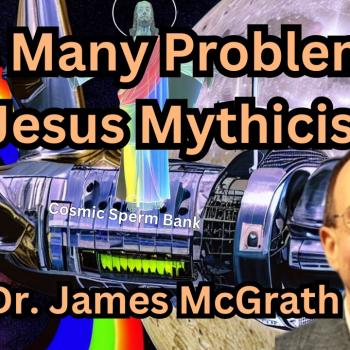Neil Godfrey's latest rant includes a quote from George Orwell, and describes the fact that I will be addressing mythicism and religious freedom in a conference paper as “Orwellian.”
And once again, there is no evidence of awareness of Poe's Law, as a mythicist writes things that seem like a ridiculous parody, something that no one could really believe, and yet it is real and not satire.
Click through, read the post, see what is going on. Look carefully at what is being done. Look at how, despite my acknowledgment that I may have run characteristics of Brodie's student work and his attempts at publication together (since they were mentioned in the same part of the book, and if such students publish anything, it tends to be work produced in the course of their studies), Godfrey continues to focus on such minor details in order to distract from the main point, which is that Brodie's methods are problematic. They allow any conclusion one wishes to be drawn, as long as one has sufficient creativity to make connections between texts.
There is nothing inherently Orwellian about academia, in the sense that Godfrey used the term. I followed the appropriate procedures and had a conference paper accepted. If mythicists follow the same rules they can do the same. But they almost never do, making it clear why mythicism is not found persuasive in the academy: it is not due to inappropriate censorship, but mythicists not following the rules of scholarly inquiry.
But of course, no good conspiracy theorist worth their salt will buy that simple explanation, when a more convoluted one that makes them look better can be concocted.
But there most definitely is something Orwellian about mythicism. Have a read of the source of the Orwell quote, in which Orwell focuses particular attention on the use of language to defend the indefensible, and talks about how that is accomplished. And then see if what Orwell wrote about political language reminds you of the sort of language you have encountered on a mythicist blog you may have read.
And then see if you can reread Godfrey's words about psychological projection without laughing out loud.













